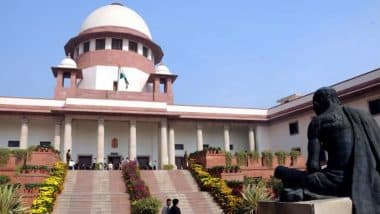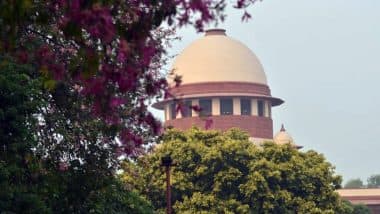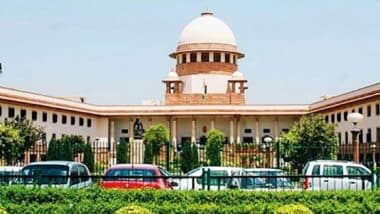New Delhi, October 15: In a special hearing on Saturday, the Supreme Court suspended the October 14 order of the Bombay High Court which discharged former Delhi University professor GN Saibaba and others in an alleged Naxal links case. A bench of Justices MR Shah and Bela M Trivedi also stayed the release of Saibaba and others from jail.
The apex court issued notice to the accused persons while hearing the Maharashtra government's plea challenging the High Court order and listed the matter for hearing on December 8. "We are of the firm opinion that the impugned judgment of the High Court is required to be suspended," said the bench. Hijab Ban: Supreme Court Verdict on Pleas Challenging Karnataka HC Judgment Tomorrow.
The top court, however, said that the accused would be at liberty to move for bail. The apex court said that the accused were convicted by the trial court after a detailed appreciation of the evidence. Hijab Ban: Supreme Court Delivers Split Verdict on Pleas Challenging Karnataka HC's Order, Matter Referred to Chief Justice of India.
"Offences are very serious and if the State succeeds on merits, offences are very serious against the interest of the society, sovereignty and integrity of India. High Court order is based on no sanction," noted the bench.It opined that the High Court did not consider the case on merits but acquitted the accused due to lack of sanction of the Central government required under Section 45 of the Unlawful Activities Prevention Act (UAPA).
The High Court has discharged the accused only on the ground that the sanction was invalid and some material which was placed before the appropriate authority and sanction was granted on the same day, said the bench.
In its order, the bench said, "This court is of prima facie opinion that a detailed scrutiny is required with regard to the impugned judgment since the High Court has not considered the merits of the case including the gravity of the offence alleged against him."
During the hearing, Solicitor General Tushar Mehta appearing for the Maharashtra government said that the failure to grant sanction cannot lead to acquittal.
Submitting his arguments, Solicitor General told the court that the "facts are very very distrubing, supporting call for arms in Jammu and Kashmir, supporting overthrowing Parliament, arranging meetings with Naxalites, attacking our security forces etc."
Senior advocate R Basant, appearing for Saibaba, urged the top court to not suspend the discharge order and that he is in prison for seven years. He said that Saibaba can be ordered to stay at home and conditions can be imposed.
The advocate said that Saibaba is disabled to 90 per cent and is having multiple other ailments which are judicially accepted and confined to his wheel chair. "His health is deteriorating, let him preserve his health," Basant added.
"There is no criminal antecedents whatsoever for him. He is leading a respectable life, may be ideologically inclined. There is nothing to show his involvement," told the senior counsel to the court.
Solicitor General said he was the brain, but there is nothing to show his involvement, said senior advocate. To this Justice Shah replied that so far as terrorist or Maoist activities are concerned, the brain is more dangerous, direct involvement is not necessary.
The Solicitor General objected to the request of Saibaba to be placed under house arrest instead of jail because of his health condition, saying there is a recent tendency among "urban naxals" to seek house arrest instead of being lodged in jail.
Yesterday, hours after the High Court acquitted Saibaba and others in the case, Maharashtra government approached the Supreme Court challenging the decision.
The appeal was mentioned before a bench of Justices DY Chandrachud and Hima Kohli by the Solicitor General seeking urgent listing of the case and later the matter was listed for hearing on Saturday.
The High Court has allowed an appeal filed by Saibaba and five others challenging a 2017 decision of the trial court convicting and sentencing him to life imprisonment under the anti-terror law UAPA. They were arrested in 2014.
The High Court has ordered the immediate release of Saibaba and the other accused, including a journalist and a JNU student. It had noted that the sanction was accorded for Saibaba's prosecution only after the trial commenced. For the other accused, the High Court had noted that the sanction order issued to prosecute them in the case under the UAPA was "bad in law and invalid".
Apart from Saibaba, the High Court acquitted Mahesh Kariman Tirki, Pandu Pora Narote, Hem Keshavdatta Mishra and Prashant Sanglikar, who were sentenced to life imprisonment, and Vijay Tirki who was awarded 10 years in jail. Narote died during the appeal process.
They were sentenced to life imprisonment by the Sessions Court at Gadchiroli, Maharashtra in March 2017 for offences under various sections of UAPA and 120 B of the Indian Penal Code for alleged association with Revolutionary Democratic Front (RDF), which was alleged to be an affiliate of outlawed Maoist organisation.
They were convicted for indulging in activities "amounting to waging war against the country".
(This is an unedited and auto-generated story from Syndicated News feed, LatestLY Staff may not have modified or edited the content body)



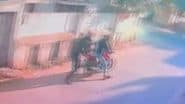




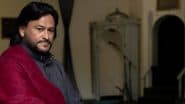


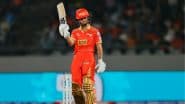

 Quickly
Quickly









